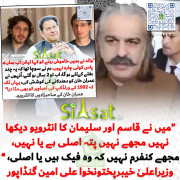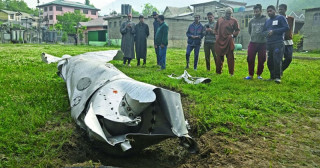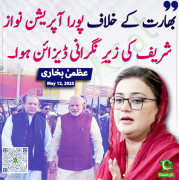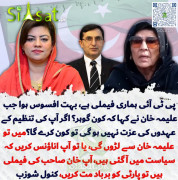canadian
Chief Minister (5k+ posts)
[SIZE=+2]A Little about his wife: Aishah Bint Abi Bakr[/SIZE]
Source: http://www.themodernreligion.com/prophet/aishah.html
[/SIZE]
Source: http://www.themodernreligion.com/prophet/aishah.html
[SIZE=-1]The life of Aishah is proof that a woman can be far more learned than men and that she can be the teacher of scholars and experts. Her life is also proof that a woman can exert influence over men and women and provide them with inspiration and leadership . Her life is also proof that the same woman can be totally feminine and be a source of pleasure, joy and comfort to her husband.[/SIZE]
[SIZE=-1]She did not graduate from any university there were no universities as such in her day. But still her utterances are studied in faculties of literature, her legal pronouncements are studied in colleges of law and her life and works are studied and researched by students and teachers of Muslim history as they have been for over a thousand years.[/SIZE]
[SIZE=-1]The bulk of her vast treasure of knowledge was obtained while she was still quite young. In her early childhood she was brought up by her father who was greatly liked and respected for he was a man of wide knowledge, gentle manners and an agreeable presence. Moreover he was the closest friend of the noble Prophet who was a frequent visitor to their home since the very early days of his mission.[/SIZE]
[SIZE=-1]In her youth, already known for her striking beauty and her formidable memory, she came under the loving care and attention of the Prophet himself. As his wife and close companion she acquired from him knowledge and insight such as no woman has ever acquired.[/SIZE]
[SIZE=-1]Aishah became the Prophet's wife in Makkah when she was most likely in the tenth year of her life but her wedding did not take place until the second year after the Hijrah when she was about fourteen or fifteen years old. Before and after her wedding she maintained a natural jollity and innocence and did not seem at all overawed by the thought of being wedded to him who was the Messenger of God whom all his companions, including her own mother and father, treated with such love and reverence as they gave to no one else.[/SIZE]
[SIZE=-1]About her wedding, she related that shortly before she was to leave her parent's house, she slipped out into the courtyard to play with a passing friend:[/SIZE]
[SIZE=-1]"I was playing on a see-saw and my long streaming hair was disheveled," she said. "They came and took me from my play and made me ready."[/SIZE]
[SIZE=-1]They dressed her in a wedding-dress made from fine red-striped cloth from Bahrain and then her mother took her to the newly-built house where some women of the Ansar were waiting outside the door. They greeted her with the words "For good and for happiness s may all be well!" Then, in the presence of the smiling Prophet, a bowl of milk was brought. The Prophet drank from it himself and offered it to Aishah. She shyly declined it but when he insisted she did so and then offered the bowl to her sister Asma who was sitting beside her. Others also drank of it and that was as much as there was of the simple and solemn occasion of their wedding. There was no wedding feast.[/SIZE]
[SIZE=-1]Marriage to the Prophet did not change her playful ways. Her young friends came regularly to visit her in her own apartment.[/SIZE]
[SIZE=-1]"I would be playing with my dolls," she said, "with the girls who were my friends, and the Prophet would come in and they would slip out of the house and he would go out after them and bring them back, for he was pleased for my sake to have them there.[/SIZE]
[SIZE=-1]"Sometimes he would say "Stay where you are" before they had time to leave, and would also join in their games. Aishah said: "One day, the Prophet came in when I was playing with the dolls and he said: 'O Aishah, whatever game is this?' 'It is Solomon's horses,' I said and he laughed." Sometimes as he came in he would screen himself with his cloak so as not to disturb Aishah and her friends.[/SIZE]
[SIZE=-1]Aishah's early life in Madinah also had its more serious and anxious times. Once her malafather and two companions who were staying with him fell ill with a dangerous fever which was common in Madinah at certain seasons. One morning Aishah went to visit him and was dismayed to find the three men lying completely weak and exhausted. She asked her father how he was and he answered her in verse but she did not understand what he was saying. The two others also answered her with lines of poetry which seemed to her to be nothing but unintelligible babbling. She was deeply troubled and went home to the Prophet saying:[/SIZE]
[SIZE=-1]"They are raving, out of their minds, through the heat of the fever." The Prophet asked what they had said and was somewhat reassured when she repeated almost word for word the lines they had uttered and which made sense although she did not fully understand and them then. This was a demonstration of the great retentive power of her memory which as the years went by were to preserve so many of the priceless sayings of the Prophet.[/SIZE]
[SIZE=-1]Of the Prophet's wives in Madinah, it was clear that it was Aishah that he loved most. From time to time, one or the other of his companions would ask:[/SIZE]
[SIZE=-1]"O Messenger of God, whom do you love most in the world?" He did not always give the same answer to this question for he felt great love for many for his daughters and their children, for Abu Bakr, for Ali, for Zayd and his son Usamah. But of his wives t he only one he named in this connection was Aishah. She too loved him greatly in return and often would seek reassurance from him that he loved her. Once she asked him: "How is your love for me?"[/SIZE]
[SIZE=-1]"Like the rope's knot," he replied meaning that it was strong and secure. And time after time thereafter, she would ask him: "How is the knot?" and he would reply: "Ala haaliha in the same condition."[/SIZE]
[SIZE=-1]As she loved the Prophet so was her love a jealous love and she could not bear the thought that the Prophet's attentions should be given to others more than seemed enough to her. She asked him:[/SIZE]
[SIZE=-1]"O Messenger of God, tell me of yourself. If you were between the two slopes of a valley, one of which had not been grazed whereas the other had been grazed, on which would you pasture your flocks?"[/SIZE]
[SIZE=-1]"On that which had not been grazed," replied the Prophet. "Even so," she said, "and I am not as any other of your wives. "Everyone of them had a husband before you, except myself." The Prophet smiled and said nothing. Of her jealousy, Aishah would say in later years:[/SIZE]
[SIZE=-1]"I was not, jealous of any other wife of the Prophet as I was jealous of Khadijah, because of his constant mentioning of her and because God had commanded him to give her good tidings of a mansion in Paradise of precious stones. And whenever he sacrifice d a sheep he would send a fair portion of it to those who had been her intimate friends. Many a time I said to him: "It is as if there had never been any other woman in the world except Khadijah."[/SIZE]
[SIZE=-1]Once, when Aishah complained and asked why he spoke so highly of "an old Quraysh woman", the Prophet was hurt and said: "She was the wife who believed in me when others rejected me. When people gave me the lie, she affirmed my truthfulness. When I stood forsaken, she spent her wealth to lighten the burden of my sorrow.."[/SIZE]
[SIZE=-1]Despite her feelings of jealousy which nonetheless were not of a destructive kind, Aishah was really a generous soul and a patient one. She bore with the rest of the Prophet's household poverty and hunger which often lasted for long periods. For days on end no fire would be lit in the sparsely furnished house of the Prophet for cooking or baking bread and they would live merely on dates and water. Poverty did not cause her distress or humiliation; self-sufficiency when it did come did not corrupt her style of life.[/SIZE]
[SIZE=-1]Once the Prophet stayed away from his wives for a month because they had distressed him by asking of him that which he did not have. This was after the Khaybar expedition when an increase of riches whetted the appetite for presents. Returning from his sel f-imposed retreat, he went first to Aishah's apartment. She was delighted to see him but he said he had received Revelation which required him to put two options before her. He then recited the verses:[/SIZE]
[SIZE=-1]"O Prophet! Say to your wives: If you desire the life of this world and its adornments, then come and I will bestow its goods upon you, and I will release you with a fair release. But if you desire God and His Messenger and the abode of the Hereafter, th en verily God has laid in store for you an immense reward for such as you who do good."[/SIZE]
[SIZE=-1]Aishah's reply was:[/SIZE]
[SIZE=-1]"Indeed I desire God and His Messenger and the abode of the Hereafter," and her response was followed by all the others.[/SIZE]
[SIZE=-1]She stuck to her choice both during the lifetime of the Prophet and afterwards. Later when the Muslims were favored with enormous riches, she was given a gift of one hundred thousand dirhams. She was fasting when she received the money and she distributed the entire amount to the poor and the needy even though she had no provisions in her house. Shortly after, a maidservant said to her: "Could you buy meat for a dirham with which to break your fast?"[/SIZE]
[SIZE=-1]"If I had remembered, I would have done so," she said. The Prophet's affection for Aishah remained to the last. During his final illness, it was to Aishah's apartment that he went at the suggestion of his wives. For much of the time he lay there on a couch with his head resting on her breast or on her lap. She it was who took a tooth stick from her brother, chewed upon it to soften it and gave it to the Prophet. Despite his weakness, he rubbed his teeth with it vigorously. Not long afterwards, he lost consciousness and Aishah thought it was the onset of death, but after an hour he opened his eyes.[/SIZE]
[SIZE=-1]Aishah it is who has preserved for us these dying moments of the most honored of God's creation, His beloved Messenger may He shower His choicest blessings on him.[/SIZE]
[SIZE=-1]When he opened his eyes again, Aishah remembered Iris having said to her: "No Prophet is taken by death until he has been shown his place in Paradise and then offered the choice, to live or die."[/SIZE]
[SIZE=-1]"He will not now choose us," she said to herself. Then she heard him murmur: "With the supreme communion in Paradise, with those upon whom God has showered His favor, the Prophets, the martyrs and the righteous..." Again she heard him murmur: "O Lord, wit h the supreme communion," and these were the last words she heard him speak. Gradually his head grew heavier upon her breast, until others in the room began to lament, and Aishah laid his head on a pillow and joined them in lamentation.[/SIZE]
[SIZE=-1]In the floor of Aishah's room near the couch where he was lying, a grave was dug in which was buried the Seal of the Prophets amid much bewilderment and great sorrow.[/SIZE]
[SIZE=-1]Aishah lived on almost fifty years after the passing away of the Prophet. She had been his wife for a decade. Much of this time was spent in learning and acquiring knowledge of the two most important sources of God's guidance, the Quran and the Sunnah of His Prophet. Aishah was one of three wives (the other two being Hafsah and Umm Salamah) who memorized the Revelation. Like Hafsah, she had her own script of the Quran written after the Prophet had died.[/SIZE]
[SIZE=-1]So far as the Hadith or sayings of the Prophet is concerned, Aishah is one of four persons (the others being Abu Hurayrah, Abdullah ibn Umar, and Anas ibn Malik) who transmitted more than two thousand sayings. Many of these pertain to some of the most intimate aspects of personal behavior which only someone in Aishah's position could have learnt. What is most important is that her knowledge of Hadith was passed on in written form by at least three persons including her nephew Urwah who became one of the greatest scholars among the generation after the Companions.[/SIZE]
[SIZE=-1]Many of the learned companions of the Prophet and their followers benefited from Aishah's knowledge. Abu Musa al-Ashari once said: "If we companions of the Messenger of God had any difficulty on a matter, we asked Aishah about it."[/SIZE]
[SIZE=-1]Her nephew Urwah asserts that she was proficient not only in fiqh but also in medicine (tibb) and poetry. Many of the senior companions of the Prophet came to her to ask for advice concerning questions of inheritance which required a highly skilled mathem atical mind. Scholars regard her as one of the earliest fuqaha of Islam along with persons like Umar ibn al-Khattab, Ali and Abdullah ibn Abbas. The Prophet referring to her extensive knowledge of Islam is reported to have said: "Learn a portion of your religion (din) from this red colored lady." "Humayra" meaning "Red-coloured" was an epithet given to Aishah by the Prophet.[/SIZE]
[SIZE=-1]Aishah not only possessed great knowledge but took an active part in education and social reform. As a teacher she had a clear and persuasive manner of speech and her power of oratory has been described in superlative terms by al-Ahnaf who said: "I have heard speeches of Abu Bakr and Umar, Uthman and Ali and the Khulafa up to this day, but I have not heard speech more persuasive and more beautiful from the mouth of any person than from the mouth of Aishah."[/SIZE]
[SIZE=-1]Men and women came from far and wide to benefit from her knowledge. The number of women is said to have been greater than that of men. Besides answering enquiries, she took boys and girls, some of them orphans, into her custody and trained them under her care and guidance. This was in addition to her relatives who received instruction from her. Her house thus became a school and an academy.[/SIZE]
[SIZE=-1]Some of her students were outstanding. We have already mentioned her nephew Urwah as a distinguished reporter of Hadith. Among her women pupils is the name of Umrah bint Abdur Rahman. She is regarded by scholars as one of the trustworthy narrators of ha dith and is said to have acted as Aishah's secretary receiving and replying to letters addressed to her. The example of Aishah in promoting education and in particular the education of Muslim women in the laws and teachings of Islam is one which needs to be followed.[/SIZE] [SIZE=-1]After Khadijah al-Kubra (the Great) and Fatimah az-Zahra (the Resplendent), Aishah as-Siddiqah (the one who affirms the Truth) is regarded as the best woman in Islam. Because of the strength of her personality, she was a leader in every field in knowledge, in society, in politics and in war. She often regretted her involvement in war but lived long enough to regain position as the most respected woman of her time. She died in the year 58 AH in the month of Ramadan and as she instructed, was buried in the Jannat al-Baqi in the City of Light, beside other companions of the Prophet.[/SIZE]
[SIZE=-1][Muhammad] [SIZE=-1][Home] [ Site Map ][/SIZE][SIZE=-1]She did not graduate from any university there were no universities as such in her day. But still her utterances are studied in faculties of literature, her legal pronouncements are studied in colleges of law and her life and works are studied and researched by students and teachers of Muslim history as they have been for over a thousand years.[/SIZE]
[SIZE=-1]The bulk of her vast treasure of knowledge was obtained while she was still quite young. In her early childhood she was brought up by her father who was greatly liked and respected for he was a man of wide knowledge, gentle manners and an agreeable presence. Moreover he was the closest friend of the noble Prophet who was a frequent visitor to their home since the very early days of his mission.[/SIZE]
[SIZE=-1]In her youth, already known for her striking beauty and her formidable memory, she came under the loving care and attention of the Prophet himself. As his wife and close companion she acquired from him knowledge and insight such as no woman has ever acquired.[/SIZE]
[SIZE=-1]Aishah became the Prophet's wife in Makkah when she was most likely in the tenth year of her life but her wedding did not take place until the second year after the Hijrah when she was about fourteen or fifteen years old. Before and after her wedding she maintained a natural jollity and innocence and did not seem at all overawed by the thought of being wedded to him who was the Messenger of God whom all his companions, including her own mother and father, treated with such love and reverence as they gave to no one else.[/SIZE]
[SIZE=-1]About her wedding, she related that shortly before she was to leave her parent's house, she slipped out into the courtyard to play with a passing friend:[/SIZE]
[SIZE=-1]"I was playing on a see-saw and my long streaming hair was disheveled," she said. "They came and took me from my play and made me ready."[/SIZE]
[SIZE=-1]They dressed her in a wedding-dress made from fine red-striped cloth from Bahrain and then her mother took her to the newly-built house where some women of the Ansar were waiting outside the door. They greeted her with the words "For good and for happiness s may all be well!" Then, in the presence of the smiling Prophet, a bowl of milk was brought. The Prophet drank from it himself and offered it to Aishah. She shyly declined it but when he insisted she did so and then offered the bowl to her sister Asma who was sitting beside her. Others also drank of it and that was as much as there was of the simple and solemn occasion of their wedding. There was no wedding feast.[/SIZE]
[SIZE=-1]Marriage to the Prophet did not change her playful ways. Her young friends came regularly to visit her in her own apartment.[/SIZE]
[SIZE=-1]"I would be playing with my dolls," she said, "with the girls who were my friends, and the Prophet would come in and they would slip out of the house and he would go out after them and bring them back, for he was pleased for my sake to have them there.[/SIZE]
[SIZE=-1]"Sometimes he would say "Stay where you are" before they had time to leave, and would also join in their games. Aishah said: "One day, the Prophet came in when I was playing with the dolls and he said: 'O Aishah, whatever game is this?' 'It is Solomon's horses,' I said and he laughed." Sometimes as he came in he would screen himself with his cloak so as not to disturb Aishah and her friends.[/SIZE]
[SIZE=-1]Aishah's early life in Madinah also had its more serious and anxious times. Once her malafather and two companions who were staying with him fell ill with a dangerous fever which was common in Madinah at certain seasons. One morning Aishah went to visit him and was dismayed to find the three men lying completely weak and exhausted. She asked her father how he was and he answered her in verse but she did not understand what he was saying. The two others also answered her with lines of poetry which seemed to her to be nothing but unintelligible babbling. She was deeply troubled and went home to the Prophet saying:[/SIZE]
[SIZE=-1]"They are raving, out of their minds, through the heat of the fever." The Prophet asked what they had said and was somewhat reassured when she repeated almost word for word the lines they had uttered and which made sense although she did not fully understand and them then. This was a demonstration of the great retentive power of her memory which as the years went by were to preserve so many of the priceless sayings of the Prophet.[/SIZE]
[SIZE=-1]Of the Prophet's wives in Madinah, it was clear that it was Aishah that he loved most. From time to time, one or the other of his companions would ask:[/SIZE]
[SIZE=-1]"O Messenger of God, whom do you love most in the world?" He did not always give the same answer to this question for he felt great love for many for his daughters and their children, for Abu Bakr, for Ali, for Zayd and his son Usamah. But of his wives t he only one he named in this connection was Aishah. She too loved him greatly in return and often would seek reassurance from him that he loved her. Once she asked him: "How is your love for me?"[/SIZE]
[SIZE=-1]"Like the rope's knot," he replied meaning that it was strong and secure. And time after time thereafter, she would ask him: "How is the knot?" and he would reply: "Ala haaliha in the same condition."[/SIZE]
[SIZE=-1]As she loved the Prophet so was her love a jealous love and she could not bear the thought that the Prophet's attentions should be given to others more than seemed enough to her. She asked him:[/SIZE]
[SIZE=-1]"O Messenger of God, tell me of yourself. If you were between the two slopes of a valley, one of which had not been grazed whereas the other had been grazed, on which would you pasture your flocks?"[/SIZE]
[SIZE=-1]"On that which had not been grazed," replied the Prophet. "Even so," she said, "and I am not as any other of your wives. "Everyone of them had a husband before you, except myself." The Prophet smiled and said nothing. Of her jealousy, Aishah would say in later years:[/SIZE]
[SIZE=-1]"I was not, jealous of any other wife of the Prophet as I was jealous of Khadijah, because of his constant mentioning of her and because God had commanded him to give her good tidings of a mansion in Paradise of precious stones. And whenever he sacrifice d a sheep he would send a fair portion of it to those who had been her intimate friends. Many a time I said to him: "It is as if there had never been any other woman in the world except Khadijah."[/SIZE]
[SIZE=-1]Once, when Aishah complained and asked why he spoke so highly of "an old Quraysh woman", the Prophet was hurt and said: "She was the wife who believed in me when others rejected me. When people gave me the lie, she affirmed my truthfulness. When I stood forsaken, she spent her wealth to lighten the burden of my sorrow.."[/SIZE]
[SIZE=-1]Despite her feelings of jealousy which nonetheless were not of a destructive kind, Aishah was really a generous soul and a patient one. She bore with the rest of the Prophet's household poverty and hunger which often lasted for long periods. For days on end no fire would be lit in the sparsely furnished house of the Prophet for cooking or baking bread and they would live merely on dates and water. Poverty did not cause her distress or humiliation; self-sufficiency when it did come did not corrupt her style of life.[/SIZE]
[SIZE=-1]Once the Prophet stayed away from his wives for a month because they had distressed him by asking of him that which he did not have. This was after the Khaybar expedition when an increase of riches whetted the appetite for presents. Returning from his sel f-imposed retreat, he went first to Aishah's apartment. She was delighted to see him but he said he had received Revelation which required him to put two options before her. He then recited the verses:[/SIZE]
[SIZE=-1]"O Prophet! Say to your wives: If you desire the life of this world and its adornments, then come and I will bestow its goods upon you, and I will release you with a fair release. But if you desire God and His Messenger and the abode of the Hereafter, th en verily God has laid in store for you an immense reward for such as you who do good."[/SIZE]
[SIZE=-1]Aishah's reply was:[/SIZE]
[SIZE=-1]"Indeed I desire God and His Messenger and the abode of the Hereafter," and her response was followed by all the others.[/SIZE]
[SIZE=-1]She stuck to her choice both during the lifetime of the Prophet and afterwards. Later when the Muslims were favored with enormous riches, she was given a gift of one hundred thousand dirhams. She was fasting when she received the money and she distributed the entire amount to the poor and the needy even though she had no provisions in her house. Shortly after, a maidservant said to her: "Could you buy meat for a dirham with which to break your fast?"[/SIZE]
[SIZE=-1]"If I had remembered, I would have done so," she said. The Prophet's affection for Aishah remained to the last. During his final illness, it was to Aishah's apartment that he went at the suggestion of his wives. For much of the time he lay there on a couch with his head resting on her breast or on her lap. She it was who took a tooth stick from her brother, chewed upon it to soften it and gave it to the Prophet. Despite his weakness, he rubbed his teeth with it vigorously. Not long afterwards, he lost consciousness and Aishah thought it was the onset of death, but after an hour he opened his eyes.[/SIZE]
[SIZE=-1]Aishah it is who has preserved for us these dying moments of the most honored of God's creation, His beloved Messenger may He shower His choicest blessings on him.[/SIZE]
[SIZE=-1]When he opened his eyes again, Aishah remembered Iris having said to her: "No Prophet is taken by death until he has been shown his place in Paradise and then offered the choice, to live or die."[/SIZE]
[SIZE=-1]"He will not now choose us," she said to herself. Then she heard him murmur: "With the supreme communion in Paradise, with those upon whom God has showered His favor, the Prophets, the martyrs and the righteous..." Again she heard him murmur: "O Lord, wit h the supreme communion," and these were the last words she heard him speak. Gradually his head grew heavier upon her breast, until others in the room began to lament, and Aishah laid his head on a pillow and joined them in lamentation.[/SIZE]
[SIZE=-1]In the floor of Aishah's room near the couch where he was lying, a grave was dug in which was buried the Seal of the Prophets amid much bewilderment and great sorrow.[/SIZE]
[SIZE=-1]Aishah lived on almost fifty years after the passing away of the Prophet. She had been his wife for a decade. Much of this time was spent in learning and acquiring knowledge of the two most important sources of God's guidance, the Quran and the Sunnah of His Prophet. Aishah was one of three wives (the other two being Hafsah and Umm Salamah) who memorized the Revelation. Like Hafsah, she had her own script of the Quran written after the Prophet had died.[/SIZE]
[SIZE=-1]So far as the Hadith or sayings of the Prophet is concerned, Aishah is one of four persons (the others being Abu Hurayrah, Abdullah ibn Umar, and Anas ibn Malik) who transmitted more than two thousand sayings. Many of these pertain to some of the most intimate aspects of personal behavior which only someone in Aishah's position could have learnt. What is most important is that her knowledge of Hadith was passed on in written form by at least three persons including her nephew Urwah who became one of the greatest scholars among the generation after the Companions.[/SIZE]
[SIZE=-1]Many of the learned companions of the Prophet and their followers benefited from Aishah's knowledge. Abu Musa al-Ashari once said: "If we companions of the Messenger of God had any difficulty on a matter, we asked Aishah about it."[/SIZE]
[SIZE=-1]Her nephew Urwah asserts that she was proficient not only in fiqh but also in medicine (tibb) and poetry. Many of the senior companions of the Prophet came to her to ask for advice concerning questions of inheritance which required a highly skilled mathem atical mind. Scholars regard her as one of the earliest fuqaha of Islam along with persons like Umar ibn al-Khattab, Ali and Abdullah ibn Abbas. The Prophet referring to her extensive knowledge of Islam is reported to have said: "Learn a portion of your religion (din) from this red colored lady." "Humayra" meaning "Red-coloured" was an epithet given to Aishah by the Prophet.[/SIZE]
[SIZE=-1]Aishah not only possessed great knowledge but took an active part in education and social reform. As a teacher she had a clear and persuasive manner of speech and her power of oratory has been described in superlative terms by al-Ahnaf who said: "I have heard speeches of Abu Bakr and Umar, Uthman and Ali and the Khulafa up to this day, but I have not heard speech more persuasive and more beautiful from the mouth of any person than from the mouth of Aishah."[/SIZE]
[SIZE=-1]Men and women came from far and wide to benefit from her knowledge. The number of women is said to have been greater than that of men. Besides answering enquiries, she took boys and girls, some of them orphans, into her custody and trained them under her care and guidance. This was in addition to her relatives who received instruction from her. Her house thus became a school and an academy.[/SIZE]
[SIZE=-1]Some of her students were outstanding. We have already mentioned her nephew Urwah as a distinguished reporter of Hadith. Among her women pupils is the name of Umrah bint Abdur Rahman. She is regarded by scholars as one of the trustworthy narrators of ha dith and is said to have acted as Aishah's secretary receiving and replying to letters addressed to her. The example of Aishah in promoting education and in particular the education of Muslim women in the laws and teachings of Islam is one which needs to be followed.[/SIZE] [SIZE=-1]After Khadijah al-Kubra (the Great) and Fatimah az-Zahra (the Resplendent), Aishah as-Siddiqah (the one who affirms the Truth) is regarded as the best woman in Islam. Because of the strength of her personality, she was a leader in every field in knowledge, in society, in politics and in war. She often regretted her involvement in war but lived long enough to regain position as the most respected woman of her time. She died in the year 58 AH in the month of Ramadan and as she instructed, was buried in the Jannat al-Baqi in the City of Light, beside other companions of the Prophet.[/SIZE]
[/SIZE]






































